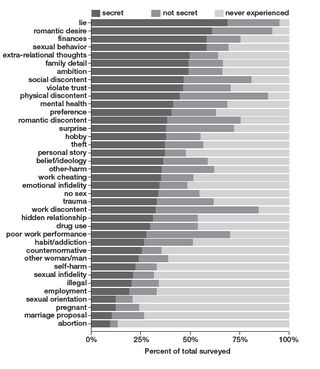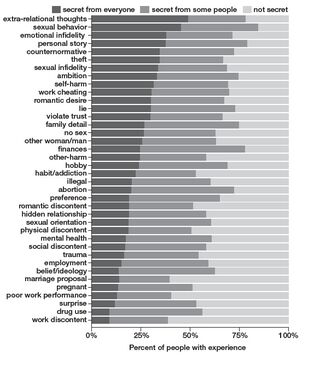Sex
The Most Common Secrets We Keep
Part I of II: The science and data on secret-keeping.
Posted June 3, 2022 Reviewed by Lybi Ma
Take a moment to consider the following experiences. For each one, ask yourself, Have I had an experience like that? And if so, was it ever a secret? Even if you have discussed the experience with someone, if you still intend to keep it from someone else, then it would still count as a secret.
• Hurt another person (emotionally or physically).
• Illegal drug use, or abuse of a legal drug (alcohol, painkillers).
• Habit or addiction ( but not involving drugs).
• Theft (any kind of taking without asking).
• Something illegal (other than drugs or theft).
• Physical self-harm.
• Abortion.
• A traumatic experience (other than the above).
• A lie.
• A violation of someone’s trust (other than by a lie).
• Romantic desire (while single).
• Romantic discontent ( being unhappy in a relationship).
• Extra-relational thoughts (thoughts about having relations with another person while in a relationship).
• Emotional infidelity (having an inappropriate emotional connection with someone, engaging in something intimate other than sex).
• Sexual infidelity.
• In a relationship with someone who is cheating on someone else to be with you.
• Social discontent (unhappy with a friend, or unhappy with current social life).
• Physical discontent (dislike of appearance or something physical about yourself).
• Mental health struggles.
• Inappropriate behavior at work or school (or lying to get hired or accepted).
• Poor performance at work or school.
• Profession, work discontent (unhappy with your situation at work or school).
• A planned marriage proposal.
• A planned surprise for someone (other than a marriage proposal).
• A hidden hobby or possession.
• A hidden current (or past) relationship.
• A family secret.
• Pregnancy.
• Sexual orientation or gender identity.
• Sexual behavior (other than sexual orientation).
• Not having sex.
• A hidden preference (or non-preference) for something.
• A hidden belief (political, religious, views about social groups, prejudices).
• Finances (spending, amount of money you have).
• A hidden current (or past) employment or school activity.
• An ambition, plan, or goal for yourself.
• Unusual or counter normative behavior (unrelated to the above).
• A specific story you keep secret (unrelated to the above).
These are the most common types of secrets that people keep—38 in total. These categories come from a survey I conducted of 2,000 people living in the United States that simply asked: What is a secret that you are currently keeping?
There were a few distinctions that our participants cared about, which we respected when making the list. For example, the difference between so-called emotional infidelity and sexual infidelity was clearly important to the people with the secret; the list makes this distinction. Likewise, illegal drug use could have been lumped with other illegal activity, but our participants were telling us that drug use was the more pertinent issue at hand, not whether it was legal or not. And theft, which we broadly define as taking without asking, was often seen as its own category: maybe you stole something as a child once, or you “borrowed” something knowing that you would never return it (I’ll admit here to both, helping myself to my brother’s Halloween candy and a friend’s pair of socks). Many of these secrets deal with relationships and sex, a theme we’ll see again and again. Others deal with our ambitions, our careers, our finances. Still, others lay bare our shames and embarrassments.
When my colleagues and I use this list in our studies, we provide examples of what we mean by “a violation of someone’s trust” (snooping on someone, revealing others’ information without their knowledge or consent, breaking or losing something that belongs to someone without telling). Likewise, for “romantic desire,” we provide a few examples so that our participants know what we have in mind (having a crush on someone, being in love with someone, wanting relations with a specific person). For the mental health category, we also give examples (fears, anxieties, depression, mental disorders, eating disorders).
I’ve shared this list with more than 50,000 research participants living across the globe. On average, they indicate having had 21 of the 38 experiences, 13 of which they keep secret. And 97 percent of my participants say they currently have at least one of the secrets from the list. (These numbers primarily reflect my American participants, I find that secrets affect us in similar ways, wherever we’re from.)
By the Numbers
Among more than 50,000 research participants I’ve surveyed, the most common secrets include a lie we’ve told (69 percent), romantic desire (61 percent), sex (58 percent), and finances (58 percent).
Next, about half of my participants report having a family secret, a secret ambition, or secret “extra-relational thoughts” (defined as having thoughts about relations with another person while already in a relationship). Former president Jimmy Carter once shocked the nation with colorful language, admitting to having this very secret in an interview with Playboy during his presidential campaign, saying, “I’ve looked on a lot of women with lust. I’ve committed adultery in my heart many times.”

Of course, you can’t keep an experience secret unless you’ve had that experience, which is why we have to look at not just the overall percentage of people who keep a given secret (the total count divided by the number surveyed). We also need to examine what percentage of people with the experience keep it secret (the count of people with a given experience who keep it secret divided by the total number of people who’ve ever had the experience, secret or not).
For example, 36 percent of all my participants say they have a secret about cheating at work or school. Among those who have ever cheated at work or school, however, most keep it secret from at least some people (69 percent).

Having a secret about extra-relational thoughts is more common (50 percent) than having a secret emotional infidelity (34 percent) or a secret sexual infidelity (21 percent). This is primarily because, whether they keep it secret or not, more people have the first experience (65 percent), than either of the latter two (48 percent and 31 percent, respectively). But also, among those with the experience, extra-relational thoughts are more frequently kept secret (78 percent), compared to emotional infidelity (68 percent) and sexual infidelity (71 percent).
The least commonly kept secrets include sexual orientation (12 percent), pregnancy (12 percent), a marriage proposal (10 percent), and abortion (9 percent). Relative to all the other secrets on the list, fewer people in my sample currently have these secrets.
Abortion is the least common experience on the list: 17 percent of the women in my data report having had an abortion, which is consistent with the national average. Among those with this experience, however, most keep it a secret from at least some people (72 percent).
Being pregnant or planning to propose marriage to your partner are less common secrets as well, but for a different reason. These secrets (along with other surprises) can only be kept for so long, so fewer people have these secrets at any given time. These more positive secrets are also kept for different reasons than many other types of secrets.
While all secrets share an element of intention, that intention need not apply to all situations or people. Some secrets you keep entirely to yourself, and others you’ve shared with at least one person but still keep from others. And so, you could have many secrets, but very few that you keep entirely to yourself. On average, I find people concurrently have five secrets they’ve never told anyone about (a “complete secret”) and eight more secrets they have discussed with at least one person but still intend to keep from others (a “confided secret”). This is where the average total of thirteen secrets comes from.
Some secrets are more frequently confided than others. For example, among people who say they have a detail about finances that one might keep secret, 53 percent keep it secret but have also confided in someone, and 24 percent keep it entirely to themselves (the remainder do not keep it secret). Compare these numbers to those around “extra-relational thoughts.” Among people who’ve had romantic or sexual thoughts about another person outside of their relationship, only 28 percent confide in someone about having this secret, and 49 percent keep it entirely to themselves. Confiding in others usually brings benefits, but not always.
When I say that people on average have 13 secrets from the list at any given time, you should take that to be an underestimate, as what this count really reflects is the number of categories of secrets people have. You could have two or more secrets that fall into the same category, especially for those that are broad, such as finances, sexual behavior, violating someone’s trust, or doing something illegal.
You might be wondering how else these secrets compare to each other. Are some more harmful than others? We can’t answer that question just yet. To do so, we need some way to compare the secrets to each other, some rules to hold them up against.
The list of secrets I’ve shared with you won’t include every single secret you have, as secrets can be about anything. But the list is fairly comprehensive. When I ask people to simply tell me about a secret they are keeping, 92 percent of the time it fits into one of the 38 categories from our list. This means that we are not so alone in the secrets we keep, despite how isolating the experience of secrecy can feel. Far from being what makes us different from others, secrecy is what we have in common.
References




